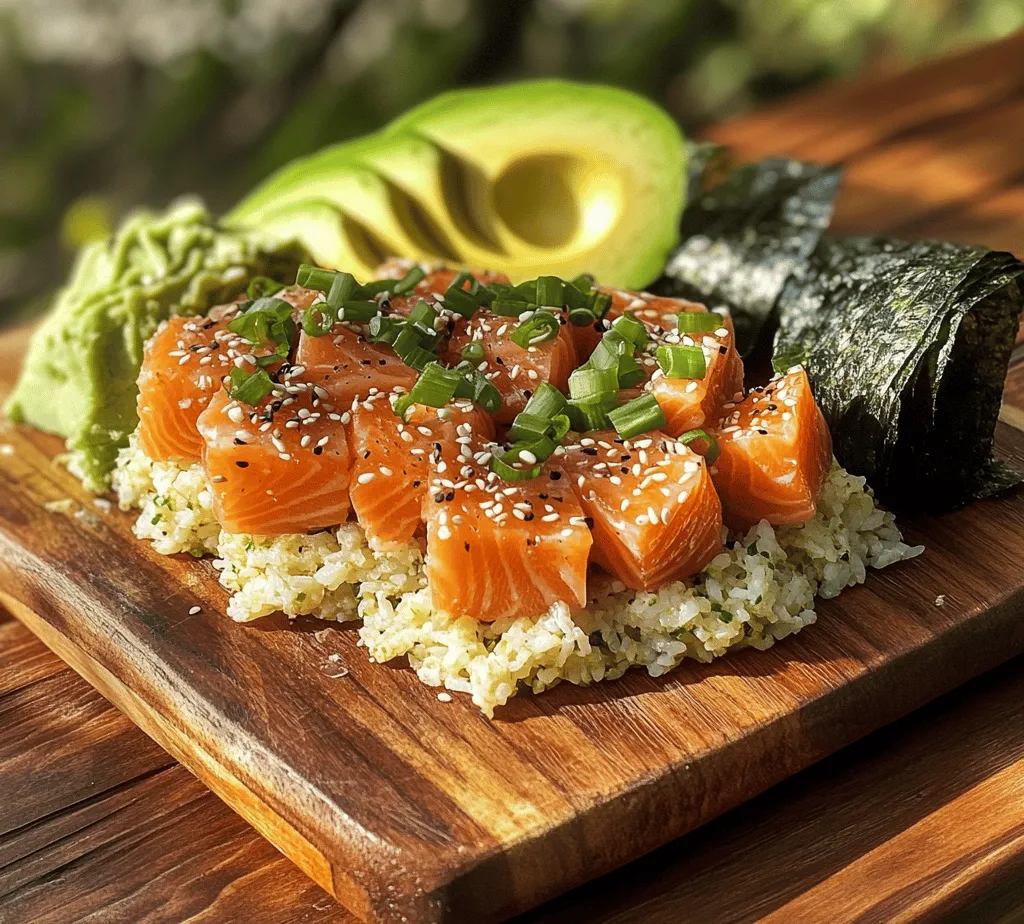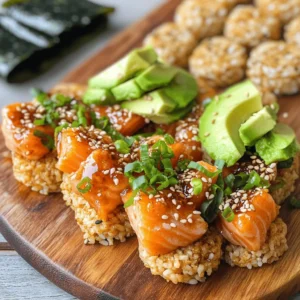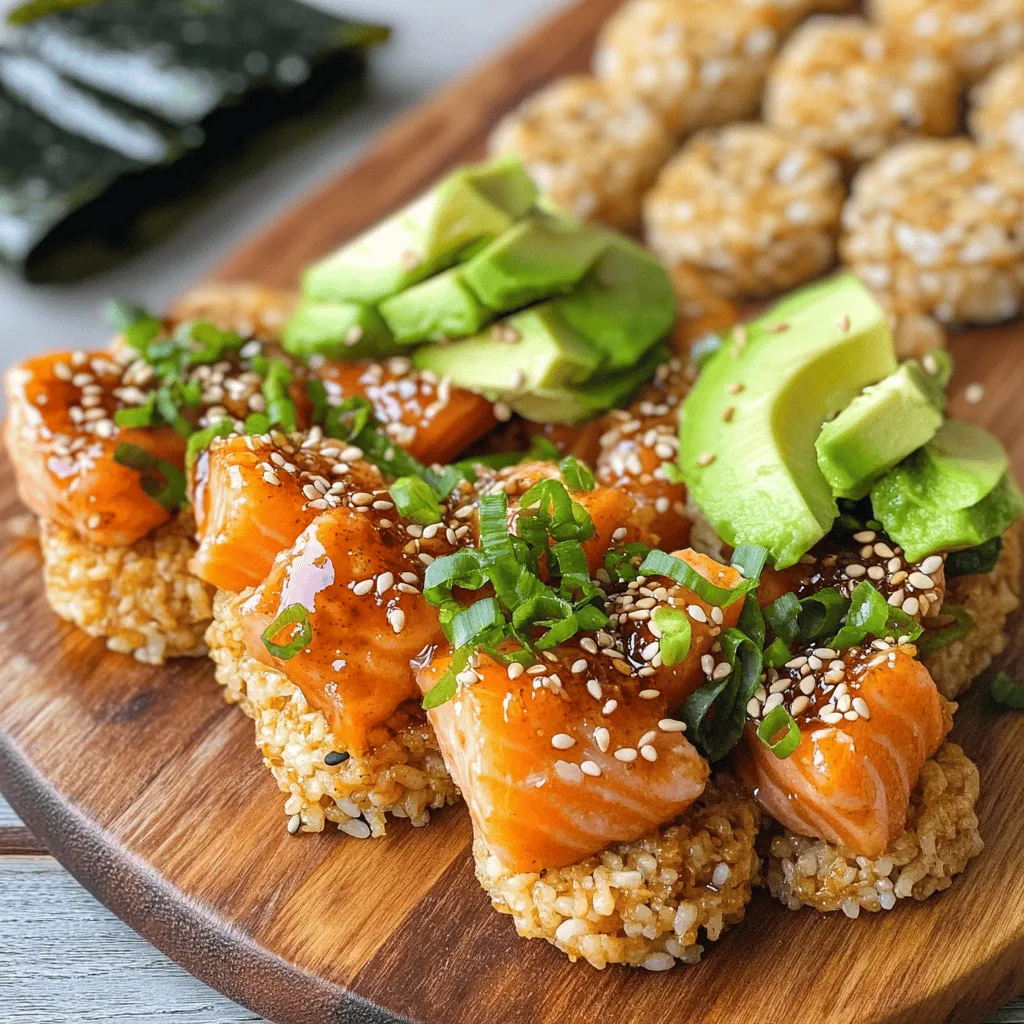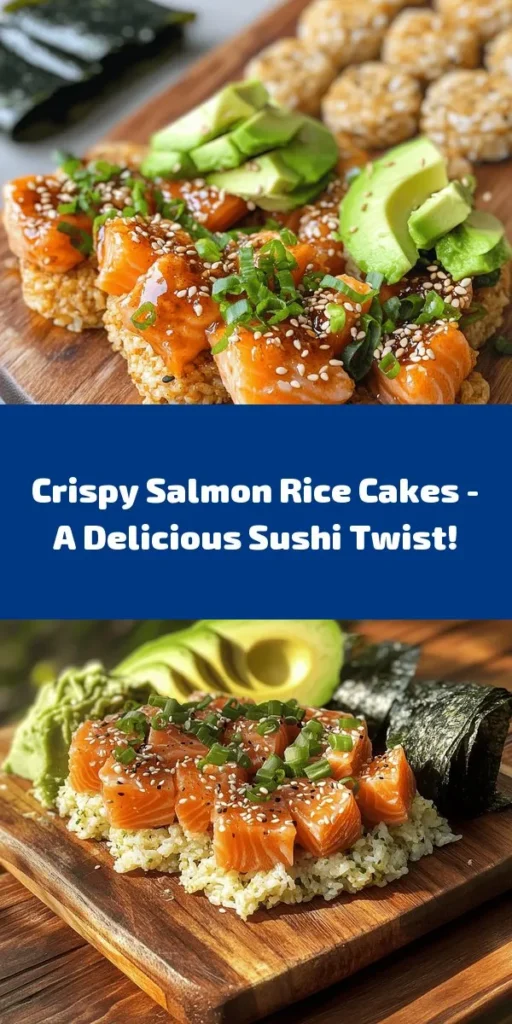Introduction
Salmon Crispy Rice has emerged as a favorite dish among food enthusiasts, skillfully marrying the delightful flavors of sushi with a satisfying crunch. This fusion dish is not only a hit in trendy restaurants but has also found its way into home kitchens, becoming a popular choice for both appetizers and main courses. It tantalizes the taste buds with a combination of fresh, high-quality ingredients, making it a treat for sushi lovers and those looking for something unique.
The appeal of Salmon Crispy Rice lies in its simplicity. While it may seem sophisticated at first glance, the recipe is rooted in straightforward techniques that highlight the freshness of each ingredient. With a golden-brown, crispy base made from sushi rice topped with perfectly seared salmon, this dish is a feast for both the eyes and the palate. Whether served at a casual gathering or a special dinner, Salmon Crispy Rice is sure to impress.
Understanding the Ingredients
To create the best Salmon Crispy Rice, it’s essential to understand the role each ingredient plays in the recipe. Let’s break down the key components to fully appreciate their importance.
Sushi Rice
The foundation of Salmon Crispy Rice is sushi rice, which is a short-grain variety known for its sticky texture. Choosing the right type of rice is crucial, as it affects the overall texture and ability to hold together when forming rice cakes. Sushi rice is higher in starch compared to long-grain varieties, making it perfect for molding into crispy bases. When cooked properly, it should be tender yet firm enough to maintain its shape when fried. Look for high-quality sushi rice at Asian grocery stores or online to ensure the best results.
Fresh Salmon
Fresh salmon is the star of this dish, providing not only a rich flavor but also numerous nutritional benefits. Salmon is packed with omega-3 fatty acids, which are essential for heart health, and it’s an excellent source of high-quality protein. When selecting salmon, freshness is key. Opt for wild-caught salmon when possible, as it tends to have a better flavor and texture compared to farmed varieties. Look for bright, firm flesh and a pleasant smell—avoid any fish that appears dull or has a strong odor. If you can, ask your fishmonger for recommendations on the best cuts for searing.
Rice Vinegar, Sugar, and Salt
These three ingredients work together to season the sushi rice and enhance its flavor. Rice vinegar is milder and slightly sweet compared to regular vinegar, making it an ideal choice for sushi rice. It adds a subtle tang that complements the fish beautifully. Sugar is used to balance the acidity of the vinegar, while salt enhances the overall taste. The key is to achieve the right balance; too much vinegar can overpower the dish, while too little may leave it bland.
Sesame Oil and Soy Sauce
These ingredients contribute richness and umami, elevating the dish to new heights. Sesame oil, with its distinctive nutty flavor, adds depth and aroma to the rice cakes. A little goes a long way, so use it sparingly. Soy sauce, a staple in Asian cuisine, brings saltiness and complexity to the salmon. When searing the salmon, a light brushing of soy sauce before cooking can create a beautifully caramelized exterior that complements the crispy rice.
Avocado, Wasabi, Green Onions, and Sesame Seeds
These garnishes not only add visual appeal but also enhance the flavor profile of the dish. Creamy avocado provides a luscious texture that contrasts with the crispiness of the rice, while wasabi adds a spicy kick that can elevate the entire experience. Thinly sliced green onions introduce a fresh, mild onion flavor, balancing the richness of the salmon. Finally, a sprinkle of sesame seeds adds a delightful crunch and nutty flavor, tying all the elements together.
Step-by-Step Preparation Guide
Now that we have a solid understanding of the ingredients, let’s dive into the step-by-step preparation guide for Salmon Crispy Rice. This process will walk you through each stage, ensuring that you achieve the perfect dish every time.
Preparing the Sushi Rice
To start, we need to prepare the sushi rice, which is at the heart of this recipe. The first step is rinsing the rice thoroughly. This crucial process removes excess starch, which can make the rice gummy when cooked. Place the sushi rice in a fine-mesh strainer or a bowl, and rinse it under cold water until the water runs clear. This may take a few minutes, but it’s worth the effort for achieving the ideal texture.
Once rinsed, cook the rice according to the package instructions. Typically, sushi rice is cooked in a rice cooker or on the stovetop with a ratio of 1:1.2 (rice to water). Once the rice is cooked, let it sit covered for about 10 minutes to allow any remaining moisture to be absorbed.
After the resting period, it’s time to season the sushi rice. In a small bowl, combine rice vinegar, sugar, and salt. The typical ratio is about ¼ cup of rice vinegar, 2 tablespoons of sugar, and 1 teaspoon of salt, but feel free to adjust according to your taste. Heat this mixture gently in a saucepan or microwave until the sugar dissolves.
Transfer the cooked rice to a large bowl or a wooden sushi tub (called a hangiri) if you have one. Pour the vinegar mixture over the rice and use a wooden spatula to gently fold it in. Be careful not to mash the rice; the goal is to coat the grains evenly while keeping them intact. As you do this, use a fan or a piece of cardboard to cool the rice down—it should be sticky yet fluffy and still warm.
Searing the Salmon
With the sushi rice ready, the next step is to sear the salmon. First, prepare your salmon fillet by ensuring it is skinless and cut into portions that will fit nicely on the rice cakes. Pat the salmon dry with paper towels; this helps achieve a good sear. Before cooking, season the salmon with a sprinkle of salt and a light brush of soy sauce to enhance its flavor.
Heat a non-stick skillet or cast-iron pan over medium-high heat. Once hot, add a small amount of oil—vegetable or canola oil works well for this purpose. When the oil is shimmering, carefully place the salmon pieces in the pan, skin-side down if applicable. Sear for about 2-3 minutes without moving them to allow a nice crust to form.
Using a spatula, flip the salmon and sear the other side for an additional 2-3 minutes. The salmon should be cooked through but still moist and tender in the center. Remove from the heat and let it cool slightly before slicing it into smaller, bite-sized pieces for assembly.
Cooling and Slicing
Once the salmon is cooked, it’s time to slice it. Cooling the salmon briefly makes it easier to handle. Use a sharp knife to cut the salmon into attractive pieces that will fit perfectly on your crispy rice cakes. Aim for uniform pieces to ensure even presentation.
Forming and Frying the Rice Cakes
Now we’re ready to form the rice cakes. With the sushi rice prepared, take a handful and mold it into small, compact rectangular shapes or patties. Be sure to press firmly enough to hold the shape but not so much that the rice becomes overly dense.
Heat a few tablespoons of oil in the same skillet used for the salmon, over medium heat. Once hot, gently place the rice cakes in the pan, being careful not to overcrowd them. Fry for about 2-3 minutes on each side until they are golden brown and crispy. You may need to adjust the heat to avoid burning. Once fried, transfer the rice cakes to a paper towel-lined plate to drain any excess oil.
With the rice cakes ready, you are just a few steps away from assembling this delightful dish. The crispy base, coupled with the tender salmon and vibrant garnishes, will create a beautiful presentation and an unforgettable flavor experience.

Shaping Techniques for Uniformity and Presentation
Creating perfectly shaped salmon crispy rice is essential for both visual appeal and consistent cooking. Start by ensuring your sushi rice is prepared correctly—sticky and slightly cooled, making it easier to mold. Use a small bowl or your hands, lightly moistened with water to prevent sticking, to form the rice into rectangular or square shapes. Aim for approximately one to two inches in thickness, which will allow for even frying and a pleasant bite.
To achieve uniformity, consider using a mold or a cookie cutter. This technique ensures that each piece of rice is the same size, which is particularly important when serving guests. A rice paddle can also be helpful in evenly distributing the rice into your desired shape. Once shaped, place the rice pieces on a parchment-lined baking sheet to keep them from sticking together while you prepare for frying.
Frying Tips: Oil Temperature and Cooking Time for Optimal Crispiness
Frying is the key step in achieving that irresistible crispy texture. Begin by selecting a neutral oil with a high smoke point, such as vegetable or canola oil. Heat the oil in a deep pan or a skillet to about 350°F (175°C). Use a kitchen thermometer to monitor the temperature accurately; if the oil is too cool, the rice will absorb more oil and become greasy rather than crispy.
Carefully lower the rice pieces into the hot oil, making sure not to overcrowd the pan, which can lower the oil temperature. Fry each piece for about 2 to 3 minutes on each side or until they achieve a beautiful golden-brown color. It is essential to keep an eye on them as they fry; the process happens quickly, and you want to prevent burning. Once they are crisp and golden, remove the rice pieces and drain them on paper towels to absorb any excess oil.
Assembly of the Dish
The assembly of your Salmon Crispy Rice is where the magic happens. Start by placing the crispy rice base on a serving platter. Next, finely slice your fresh salmon, ensuring the cuts are uniform for aesthetic appeal. Lay a piece of salmon on top of each crispy rice square, allowing the natural pink hue to contrast beautifully with the golden rice.
For an extra flavor boost, drizzle a small amount of soy sauce or ponzu sauce over the salmon. If you want to elevate the dish further, consider adding toppings such as thinly sliced green onions, sesame seeds, or a dollop of wasabi mayo for a spicy kick. Be mindful of the balance of flavors; you want to enhance the taste without overpowering the delicate flavor of the salmon.
Layering Components for Visual Appeal and Balanced Flavor
Layering is crucial in culinary presentation, especially for a dish as visually appealing as Salmon Crispy Rice. Start with the foundational crispy rice, and layer it with fresh salmon. Then, add a thin slice of avocado for creaminess and a pop of green color. This is not only visually attractive but also adds a rich texture that complements the crispiness of the rice and the tenderness of the salmon.
For an added crunch, sprinkle some fried shallots or tempura flakes on top. This layer not only enhances the dish’s texture but also introduces another flavor dimension. Finally, finish with a sprinkle of microgreens or edible flowers for a sophisticated touch. The juxtaposition of colors and textures will make your dish visually stunning and encourage your guests to dig in.
Presentation Suggestions to Enhance the Dining Experience
Presentation can make or break a dining experience. When serving Salmon Crispy Rice, consider using a beautiful wooden sushi platter or a sleek white plate to let the colors of the dish shine. You can also serve the rice squares in a staggered formation rather than in a straight line to create visual interest.
Garnishing the plate with a few slices of pickled ginger and wasabi can enhance the presentation and provide diners with traditional sushi accompaniments. Additionally, a small bowl of soy sauce or dipping sauce can be served on the side, inviting guests to personalize their flavor experience. Consider lighting a few candles or using ambient lighting to create a warm, inviting atmosphere that complements the delightful meal you’ve prepared.
Nutritional Benefits of Salmon Crispy Rice
Salmon is not only delicious but also packed with nutritional benefits. It is an excellent source of high-quality protein, omega-3 fatty acids, and essential vitamins, including B12 and D. Omega-3 fatty acids are known for their heart health benefits, helping to reduce inflammation and lower blood pressure.
The sushi rice, while primarily a carbohydrate source, is also enriched with fiber and essential minerals, especially when prepared with brown rice. The avocado, if included, adds healthy fats and potassium, making the dish well-rounded. Together, these ingredients create a balance of macronutrients—healthy fats, protein, and carbohydrates—necessary for a nutritious meal.
Using fresh, high-quality ingredients is crucial in maintaining the dish’s nutritional integrity. The fresher the salmon and produce, the better the flavors and health benefits. Opt for wild-caught salmon, if possible, for optimal nutrition and sustainability.
Cultural Significance of Sushi and Its Variations
Sushi has a rich history that dates back centuries, originally beginning as a method of preserving fish in fermented rice. Over time, this culinary practice evolved into the sushi we know today, with various styles and preparations reflecting regional ingredients and tastes. Salmon Crispy Rice is a modern interpretation that highlights the fusion of traditional sushi with contemporary cooking techniques, showcasing the creativity of today’s chefs.
This dish embodies the spirit of sushi by celebrating fresh ingredients while offering a playful twist. The combination of crispy rice and fresh salmon not only appeals to the palate but also visually represents the convergence of past and present in culinary arts. As sushi continues to evolve, dishes like Salmon Crispy Rice allow home cooks to experiment with flavors while honoring the tradition of sushi-making.
Serving Suggestions and Variations
Salmon Crispy Rice is perfect for gatherings and special occasions, offering a unique and appealing dish that can impress guests. Consider serving it as part of a sushi platter alongside other varieties like spicy tuna rolls or vegetable sushi to create a delightful spread.
For those who prefer dietary modifications, there are plenty of variations to consider. You can substitute the salmon with other proteins like seared tuna, grilled chicken, or tofu for a vegetarian option. Additionally, try different toppings such as pickled vegetables, kimchi, or even a drizzle of sriracha for those who enjoy a bit of heat.
To complement your Salmon Crispy Rice, consider serving side dishes like miso soup, seaweed salad, or edamame. Beverage pairings could include green tea, sake, or a light white wine, enhancing the overall dining experience.
Conclusion
In summary, Salmon Crispy Rice is not just a delightful dish but a celebration of flavors, textures, and culinary history. By following the detailed steps provided, you can create a visually stunning and delicious meal that is sure to impress. Don’t hesitate to experiment with the recipe, customizing it to suit your preferences or dietary needs.
Cooking is an opportunity to connect with loved ones, and sharing homemade meals can create cherished memories. Dive into the world of sushi-making, and let the joy of cooking inspire you to try new ingredients and techniques. Whether you’re hosting a gathering or enjoying a quiet night in, Salmon Crispy Rice is a versatile dish that brings both satisfaction and delight to the table.



